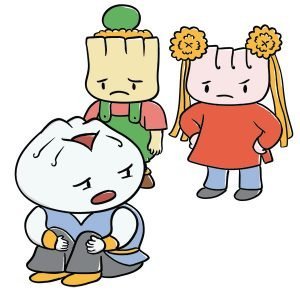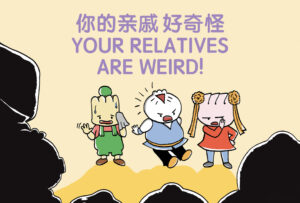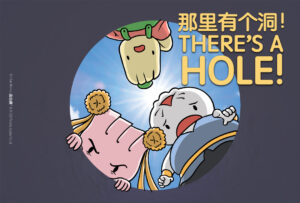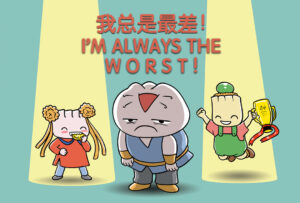How to Raise Kids With Empathy
As I was stressing in front of my computer over an app update that went wrong the other day, my 12-year-old quietly brought me a cup of tea with some honey and flower petals. I didn’t notice it at first, but when I did, my heart was suddenly warmed by the thought that my daughter had noticed my distress and wanted to make me feel better.
Empathy
Simply put, empathy is the ability to put ourselves in someone else’s shoes to understand and experience what they are going through, and to take some action that makes that person feel better.
However, research in leadership reveals that it is a crucial attribute to leadership as it drives success and innovation. (See this Forbes article: Empathy Is the Most Important Leadership Skill)
As CEO of Yumcha Studios, when I’m hiring, I find myself looking for staff who are empathetic – whether they are writers, translations, engineers. Crucial to their skill set must be the ability to bend towards their co-workers and also towards our customers— to see how they are experiencing our product, what questions they might have, etc.
Empathetic team members will not simply fulfill their responsibilities by “telling” customers and co-workers what to do, but will make the effort to ensure what is told is easily absorbed and learned.
In a study conducted by Businessolver, 76% of CEOs surveyed agree that the performance of a company is tied to empathy.
The “Performance” Kind of Empathy
I have to confess that I’ve been guilty of the “performance” kind of empathy where I “look like” I’m teaching my child empathy, but I really just want other parents to think that I’m a nice person and a good parent who cares about kindness.
For example, in the sandpit, I might tell my own child within earshot of the other parents, “you have to share, all right?” or “how do you think Angel will feel if she doesn’t get a chance to play with the truck?” So annoying … if I might say so myself.
But whenever our kids come home from school, we inevitably ask our kids for one or more of the following reports:
- Homework (“what homework do you have?”)
- Test Scores (“what did you get in the Science test?” and “What did the other students get?”)
- Praise (“what did the teacher say about the essay you wrote?”)
Very rarely do we ask about experiences of empathy, such as “Did you do anything for the upset kid?” or “How do you think Angel felt about the misunderstanding?”.
Kids understand that what is noticed becomes valuable (homework, test scores, praise) and what is not noticed must therefore be much less important.
We must notice and value empathetic behavior more.
To cultivate empathy, we also have to model empathy and not just perform empathy when there’s an audience.
Modelling Empathy
At a basic level, to teach our children empathy, they have to experience it.
And that means time and attention must be paid to how our children are feeling, whether through verbal means or otherwise.
Perhaps it’s chatting during car rides about interesting, funny or silly things that happened in school, or acts of kindness; perhaps it’s cuddling and reading before bedtime when our children are most relaxed and are able to open up their inner worlds to us.
It requires time and attention and not just the cursory, “are you ok?”
Our words of empathy, accompanied by attention and concrete actions, really sharpen our children’s sensitivity to other people’s feelings.
Empathy Examples:
I remember that when I was young, whenever I had a fever, my mom would place a light cotton towel under my shirt, so that if I was sweating through the night, she could pull out the towel to keep my shirt dry without waking me.
I also remember that when I was a child, whenever there were workers who came to our apartment to make repairs or paint a wall, my mom would make sure that they had a cold drink (because it’s very hot in Singapore).
Even though we were not well off at all, we always had small birthday parties where I got to invite my friends, and there would be a few yummy dishes or sandwiches that my mom would make.
Whenever any member of the family is sick or has to undergo surgery, the extended family would visit at various points, helping out by making food, boiling soup, babysitting, etc.
These gestures of empathy and connection felt like habits, nothing declarative or that looked like planned performances.
They were also not about being polite or friendly, but actual acts of kindness that that required time and attention, and that have real benefit for each other.
These acts had a real impact on how I behaved as a teacher, a mom, a creator, and in relation to our customers and staff. I am always reminded of how my mom would stay several steps ahead of what the person needed so that it didn’t require asking, but it required that she imagined what it would be like to be that person.
Stories About Different Experiences
Educational philosopher Maxine Greene (2000), talks about how we cannot “separate imagination from the ethical, the political, the social” and that means that the beginning of empathy is really imagination —can we imagine how others feel?
Encouraging such imagination includes real and meaningful interaction with people who are different from ourselves, in the shared spaces of schools, stores, and neighborhoods.
Christian Picciolini talks about his transformation from being a neo-Nazi, and how he came to have empathy for people different from himself after he ran a record store where he started to have “meaningful interactions” with people who were African-American and Jewish:
“In fact, I’d never in my life engaged in a meaningful dialogue with the people that I thought I hated. And it was these folks who showed me empathy when I least deserved it, and they were the ones that I least deserved it from. And I started to recognize that I had more in common with them than the people I had surrounded myself for eight years with and that these people that I thought I hated took it upon themselves to see something inside of me that I didn’t even see myself. And it was because of that connection that I was able to humanize them, and that destroyed the demonization and the prejudice that was happening inside of me.”
Making sure that our children have meaningful interactions with people who are different from ourselves builds empathy.
Creating, writing and reading stories is also a practice of empathy, because they involve imagining ourselves in someone else’s shoes.
Stories about the experiences of people who are different from ourselves are great for discussions with our children about how everyone might come to experience the world differently.
Some stories about children growing up in ways that are different from our own lives include:
- The Kite Runner (Book and Movie),
- Not One Less (Chinese movie),
- The Curious Incident of the Dog in the Nighttime (Play),
- The Boy Who Harnessed the Wind (film and memoir).
These stories teach us that what we have taken for granted in our lives—flying in airplanes, buying from toy stores, etc. —are in fact not as “normal” as we think.
Empathy Doesn’t Mean Compliance
I have a kind and loving daughter BUT I have to continually remind myself that empathy doesn’t mean good behavior or compliance.
There are times when an act of empathy is making a cup of tea for me, and there are times when an act of empathy also means advocating on behalf of someone against an authority or even against me.
When we look at youth activists like Malala Yousafzai and Greta Thurnberg, their empathy for others is equality matched by their tough critical thinking—asking why things have to be the way they are.
Ultimately, this is perhaps why as parents, it is much easier to ask our children about test scores.
True empathy ultimately requires action on behalf of others, which is much, much harder than doing well on a test.
Dim Sum Warriors Stories to Build Empathy
The following are Dim Sum Warriors stories that are great for empathy-building discussions:
#5 “Your Relatives are Weird!” 《你的亲戚好奇怪!》
Xiajiao thinks Baozi’s relatives are so weird because they are named by size, but Shaomai reminds her that to others, their own relatives are rather weird as well. When we think other people are weird, are they really “weird” or simply “different” from ourselves?
#8 “There’s a Hole!” 《哪里有个洞》
Xiajiao and Baozi see a hole in the road and argue about what to do about it. Xiajiao says it doesn’t concern her, Baozi says he is worried, but can’t do anything about it. But Shaomai does something, in his own small way, that actually prevents other people from falling into the hole. There are many problems in the world, such as climate change – what can we do about it?
#13 “I Am Always the Worst!” 《我总是最差的!》
Shaomai and Xiajiao enjoy competing because they always win, but Baozi wants to stop because he always loses. Can we put ourselves in the shoes of the person who “loses”?
#16 “Merry Eggsmas!” 《生蛋快乐!》:
Baozi assumes that all kids must love Eggsmas because they must all get presents and have a chimney for Father Eggsmas to climb down through. But Shaomai tells him that he’s never received Eggsmas presents and doesn’t live in a house with a chimney. Can we put ourselves in the shoes of people who live in situations that are different from ours?
References
- Kohn, Alfie (1997). How not to each values: a critical look at character education. Phi Delta Kappan, 78(6).
- Levine, Cat (2020). Creating kind kids: building empathy: 6 ways to develop empathy in children. Teachers Matter, 48(p28-29).
- Brower, Tracy (2021). Empathy is the most important leadership skill according to research. Forbes: https://www.forbes.com/sites/tracybrower/2021/09/19/empathy-is-the-most-important-leadership-skill-according-to-research/?sh=772cfb563dc5
Dr. Yen Yen Woo works on educating for a multicultural and multilingual world through popular culture. She most recently co-created the Dim Sum Warriors app, characters and stories for Bilingual Learning. She has a Doctorate in Education from Teachers College, Columbia University and has been a tenured professor of education. She is also an award-winning film director and screenwriter. Her works have been licensed by HBO and Netflix and featured on BBC, Fast Company, Wired, and other global publications. Email: yenyen@dimsumwarriors.com.





